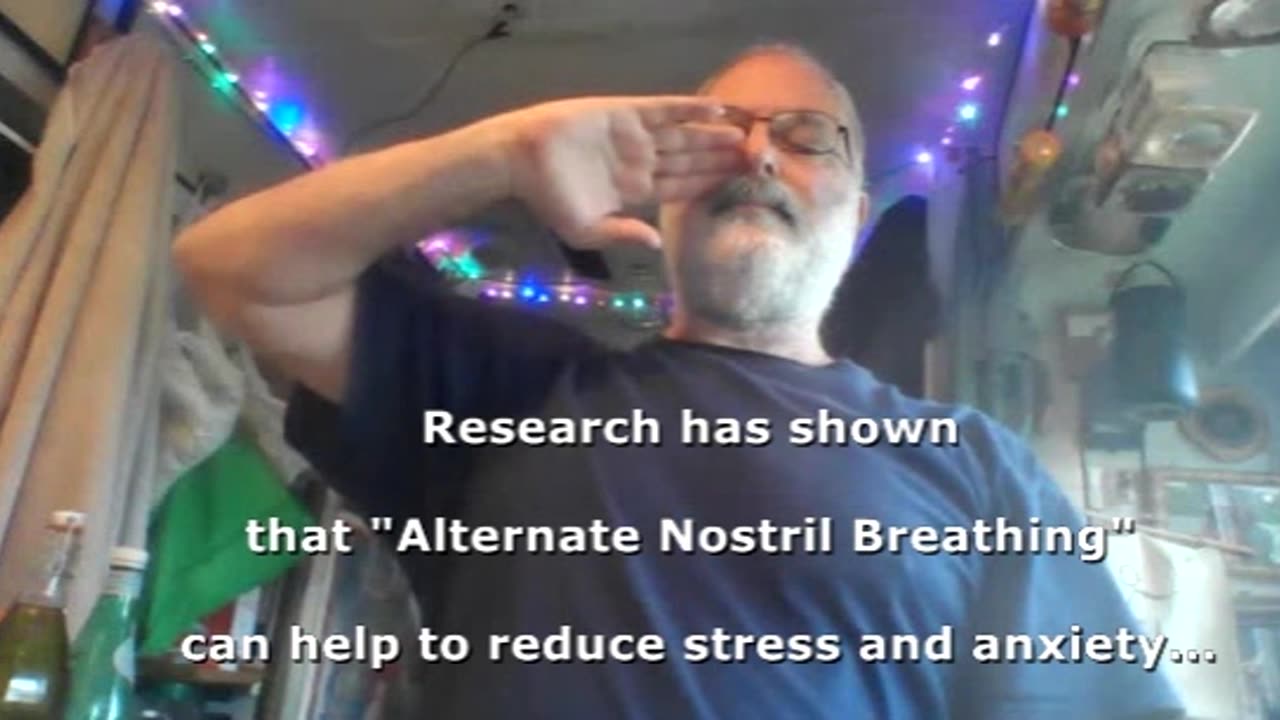Premium Only Content

#MECFS 💖 A wide range of benefits for both the mind and body by practicing Alternate Nostril Breathing
Alternate nostril breathing is a breathing technique that has been practiced for centuries in the yogic tradition. Alternate nostril breathing is also known to have a number of physiological benefits. By focusing on the breath and practicing slow, deep breathing, we can lower our heart rate, reduce stress, and promote relaxation throughout the body. This can be particularly helpful for those who suffer from anxiety, depression, or other stress-related conditions.
Some of the primary benefits of alternate nostril breathing include the experience of greater health, vitality, and spiritual awareness.
Research has also shown that practicing alternate nostril breathing can improve respiratory function and reduce symptoms of asthma and other breathing disorders. By practicing alternate nostril breathing, we can strengthen the lungs and breathing muscles, and improve overall respiratory health.
Alternate nostril breathing can also be a useful tool for managing stress and anxiety, which are common symptoms in people with ME/CFS. By slowing down and deepening the breath, alternate nostril breathing activates the parasympathetic nervous system, which can promote relaxation and reduce feelings of tension and anxiety.
Furthermore, research has shown that practicing alternate nostril breathing can improve cognitive function, including memory and attention span. This is particularly important for people with ME/CFS who may experience cognitive difficulties, such as brain fog and difficulty concentrating.
Alternate nostril breathing is a simple and accessible practice that can be done anywhere, at any time. Whether you are sitting at your desk, stuck in traffic, or lying in bed at night, you can take a few minutes to focus on your breath and practice..
This makes it a great tool for managing stress and improving overall well-being, even in the midst of a busy or hectic day.
In conclusion, alternate nostril breathing is a powerful technique that offers a wide range of benefits for both the mind and body. By balancing our sympathetic and parasympathetic nervous systems, alternate breathing promotes relaxation, and improved respiratory function.
This practice can help us to achieve greater health, vitality, and peace of mind. Whether you are an experienced yogi or a complete beginner, adding alternate nostril breathing to your daily routine can be a simple and effective way to support your overall health and well-being.
This practice can help us to achieve greater health, vitality, and peace of mind. Whether you are an experienced yogi or a complete beginner, adding alternate nostril breathing to your daily routine can be a simple and effective way to support your overall health and well-being.
NOTE: As with any new exercise or wellness program, it is beneficial to consult with your physician, start slowly, listen to your body, and make modifications as needed to ensure your safety and comfort.
I have been looking into the Polyvagal theory which is a theory developed by Dr. Stephen Porges that explains how the vagus nerve plays a crucial role in regulating the body's autonomic nervous system, which controls unconscious functions such as heart rate, digestion, and breathing. The theory proposes that the vagus nerve has two branches - the sympathetic branch and the parasympathetic branch - which are responsible for activating the body's "fight or flight" response and its "rest and digest" response, respectively.
Polyvagal theory suggests that when people experience stress, trauma, or other negative emotions, their body's autonomic nervous system can become dysregulated, leading to a range of physical and psychological symptoms. The theory proposes that by engaging the parasympathetic branch of the vagus nerve through techniques such as slow breathing, meditation, and social engagement, individuals can regulate their autonomic nervous system and improve their physical and mental health.
In the context of MECFS & long COVID, slow breathing and other techniques that engage the parasympathetic branch of the vagus nerve may help to alleviate symptoms such as fatigue, brain fog, and shortness of breath that are associated with dysregulated autonomic function.
It makes a lot of sense and is encouraging me to get better at doing things that help regulate the autonomic nervous system and especially to reduce the sympathetic and activate the parasympathetic.
If you enjoyed this video, please like, subscribe & buy me a cup of coffee to support my channel for more content like this in the future. https://www.buymeacoffee.com/sRCfEeyDV
♡♡♡♡♡♡♡ Thank You! ♡♡♡♡♡♡♡
♡ May we all be happy, well and safe ♡ May we all learn to live in peace and harmony with ourselves, each other, the earth and all that lives ♡ Thank You for all you do to help encourage a world of global well-being, compassion, love and respect. ♡ Starting with ourselves & then in an ever expanding spiral of Love Kindness & Compassion outward. We really do make a difference. ♡ People are changing for the better more and more every day. ♡ We just have to keep fanning the flame of both local and global loving-kindness, and compassion for ourselves, the earth, each other, and all that lives. ♡Thank you Everyone for being a flame fanner with me. We all make a difference. Let it be for the good, love and respect of all. 🙏👍😄💕
"Love and compassion are necessities, not luxuries. Without them humanity cannot survive"
~ H.H. Dalai Lama
"All people are united in our pursuit of happiness and our desire to avoid suffering. This is the source of humanity’s greatest achievements. For that reason, we should begin to think and act on the basis of an identity rooted in the words 'we humans.'”
~ HH Dalai Lama
Use your voice for kindness,
your ears for compassion,
your hands for charity,
your mind for truth,
and your Heart for Love ♡
Thank you for watching my videos...
and supporting me in doing what I love most...
helping others :)
May you find peace, joy, and well-being on your journey.
-
 LIVE
LIVE
VikingsOutlawsAndCowboys
7 hours agoVOC SHOW LIVE - #9
68 watching -
 43:22
43:22
PMG
22 hours ago"Sean Parnell Speaks Out for Tulsi Gabbard and Pete Hegseth; J6 Pardons Needed"
2133 -
 LIVE
LIVE
Flyover Conservatives
21 hours agoShifting Alliances: Tulsi, Musk, RFK, Rogan… CAN THEY BE TRUSTED? - Roger Stone | FOC Show
1,155 watching -
 39:01
39:01
The Why Files
8 days agoSymbols of Power: Deciphering the Language of the Secret Elite
96.8K61 -
 1:07:16
1:07:16
Edge of Wonder
7 hours agoWho Are the Men in Black? The CIA Connection
13.7K4 -
 45:17
45:17
The Officer Tatum
8 hours agoLIVE: Scott Jennings INCINERATES CNN, DNC Union BEGS For Money, + MORE | OT Show EP 15
107K116 -
 14:45
14:45
Tundra Tactical
5 hours ago $1.76 earnedFirst Impression of the Labradar LX Chronograph.
32.2K -
 54:52
54:52
LFA TV
1 day agoAnti-Trump Lawfare Has Failed | Trumpet Daily 11.26.24 7PM EST
29.9K4 -
 29:44
29:44
Standpoint with Gabe Groisman
11 hours agoEP. 59. The State of Western Militaries Today. Col. Richard Kemp
49.9K4 -
 47:24
47:24
Candace Show Podcast
6 hours agoConor McGregor: GUILTY—But Of What? | Candace Ep 111
118K345